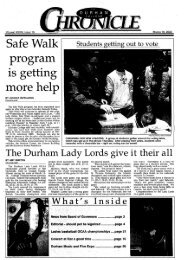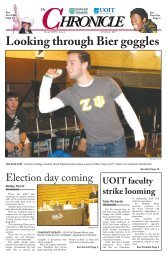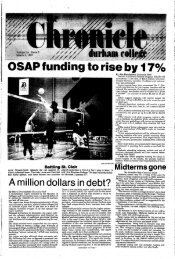CAMPUS NEWS - Durham College and UOIT
CAMPUS NEWS - Durham College and UOIT
CAMPUS NEWS - Durham College and UOIT
Create successful ePaper yourself
Turn your PDF publications into a flip-book with our unique Google optimized e-Paper software.
By Asmahan Garrib<br />
Chronicle Staff<br />
They shoved grass in Lumo’s<br />
mouth <strong>and</strong> tied her with her<br />
clothes. Afterwards, she couldn’t<br />
walk so they used her clothes to<br />
drag her along the ground. A hunter<br />
found her the next day. Lumo<br />
was hospitalized for three years.<br />
After nine operations she still has<br />
a fistula, a hole between her birth<br />
passage <strong>and</strong> internal organs. Her<br />
husb<strong>and</strong> left her <strong>and</strong> got his dowry<br />
back.<br />
Lumo is just one of more than<br />
200,000 women who have been<br />
raped in the Democratic Republic<br />
of the Congo since an ongoing<br />
conflict started in 1996. Her story<br />
was one of the many told during<br />
the Women in the Congo Teach-In,<br />
which captivated an audience of<br />
eight who sat in to learn about the<br />
atrocities <strong>and</strong> struggles millions of<br />
women suffer through each day.<br />
Approximately 40 women are<br />
raped every day in southern Kivu,<br />
a province in eastern Congo. Almost<br />
50 per cent of those sexual<br />
assault survivors are children.<br />
“One of the ways the soldiers<br />
maintain power is to victimize<br />
women over <strong>and</strong> over again,” said<br />
Allison Alex<strong>and</strong>er, co-ordinator<br />
of the Women’s Centre. “It’s a sick<br />
sense of power that they must<br />
maintain. It’s also a way of traumatizing<br />
the man, having to see<br />
his wife or mother or sister raped.<br />
Then the man leaves the woman,<br />
so she is victimized <strong>and</strong> victimized<br />
again.”<br />
In a presentation that included<br />
a first-h<strong>and</strong> video illustrating the<br />
horrors these women endure, a<br />
PowerPoint presentation detailing<br />
the history of violence <strong>and</strong> a group<br />
discussion to find ways to help,<br />
this year’s Women’s Centre cause<br />
brought awareness to a topic few<br />
people in this part of the world<br />
know much about.<br />
“We want people to be aware<br />
of what’s happening to women in<br />
the Congo,” said Stephanie Armstrong,<br />
a first-year Human Services<br />
Worker student <strong>and</strong> one of<br />
the presenters of the teach-in. “We<br />
think people know, but not to the<br />
extent of how bad it really is.”<br />
The Democratic Republic of the<br />
Congo is the third largest country<br />
in Africa, situated north of Angola<br />
<strong>and</strong> Zambia. It has been ravaged<br />
by conflict since the 1880s.<br />
“Women <strong>and</strong> girls are feeling<br />
the brunt of this war,” said Viola<br />
Morrison, a first-year Human Services<br />
Worker student <strong>and</strong> one of<br />
the presenters of the teach-in. “But<br />
the root of this conflict goes back<br />
to the 1800s when the Democratic<br />
Republic of the Congo was ruled<br />
by leaders who didn’t have the<br />
rights of the people at heart.”<br />
Belgian King Leopold II took<br />
control of the Congo in 1880, exploiting<br />
its natural resources--tin<br />
<strong>and</strong> rubber. Violence, forced labour<br />
<strong>and</strong> starvation caused the<br />
death of millions of people. After<br />
gaining its independence in 1960<br />
the Democratic Republic of the<br />
Congo faced a nationwide army<br />
mutiny.<br />
Joseph Desire Mobutu took<br />
power of the Congo in 1965 <strong>and</strong><br />
in 1994 provided a safe haven for<br />
the militia that directed Rw<strong>and</strong>a’s<br />
genocide. This provoked Rw<strong>and</strong>a<br />
<strong>and</strong> Ug<strong>and</strong>a to invade Congo in<br />
1996 in pursuit of the Rw<strong>and</strong>an<br />
militia, pushing out Mobutu <strong>and</strong><br />
allowing Congolese rebel Laurent-<br />
<strong>CAMPUS</strong> <strong>NEWS</strong><br />
Desire Kabila to take power.<br />
“Between 1996 <strong>and</strong> 2002, the<br />
two massive wars fought in the<br />
Democratic Republic of the Congo<br />
were arguably the world’s deadliest<br />
since WWII,” said Morrison.<br />
Since the 2002 peace agreement,<br />
conflict has erupted in eastern<br />
Congo in a battle for control of<br />
natural resources.<br />
“Eastern Congo right now is the<br />
most dangerous place in the world<br />
to be a woman or girl,” said April<br />
Witt, first-year Health Services student<br />
<strong>and</strong> a presenter at the teachin.<br />
“Doctors without Borders has<br />
stated that 75 per cent of all the<br />
rape cases it has treated are in the<br />
Congo.”<br />
The presentation started with a<br />
YouTube video titled The Greatest<br />
Silence: Rape in the Congo. Guests<br />
at the teach-in watched as Congolese<br />
women <strong>and</strong> children recounted<br />
their stories of rape <strong>and</strong> torture.<br />
One woman recounted being<br />
raped in front of her children, then<br />
the soldiers shooting her children<br />
The Chronicle March 17, 2009 7<br />
Congo teach-in raises awareness<br />
By Melissa Bies<br />
Chronicle Staff<br />
Every year, thous<strong>and</strong>s of students graduate with a business<br />
degree or diploma in Ontario <strong>and</strong> begin searching for<br />
a job in their field.<br />
As resumes pour in to potential employers, what makes<br />
one student’s credentials looks more appealing than the<br />
others?<br />
Jake Simmons believes that what helped him obtain an<br />
exciting, challenging <strong>and</strong> well-paying entry-level marketing<br />
position was the <strong>Durham</strong> <strong>College</strong> Marketing Competition<br />
(DCMC).<br />
Simmons graduated from <strong>Durham</strong> <strong>College</strong>’s three-year<br />
Business – Marketing program last year. In both his second<br />
<strong>and</strong> third years, he competed <strong>and</strong> placed in the annual<br />
competiton.<br />
“Competing in the DCMC is something that can really<br />
Photo by Asmahan Garrib<br />
WOMEN HELPING WOMEN: First-year Human Services Worker students Viola Morrison,<br />
Ashley King, Stephanie Armstrong (back row), Sarah Ojha <strong>and</strong> April Witt (front<br />
row) with Women’s Centre co-ordinator Allison Alex<strong>and</strong>er (on right).<br />
help you st<strong>and</strong> out in the crowd to potential employers.<br />
You gain experience <strong>and</strong> have something for your portfolio<br />
that looks great to pull out in an interview. It’s something<br />
above <strong>and</strong> beyond going to class.”<br />
The DCMC is a full-day competition that takes place<br />
Friday, March 20. In teams of five, Marketing students<br />
must come up with a product or service based on a chosen<br />
industry. Teams must consist of at least one first- or<br />
second-year student. They must create a sales pitch <strong>and</strong><br />
business plan <strong>and</strong> present it to a panel of judges.<br />
The judges will have “money” to invest in products or<br />
services, <strong>and</strong> will allocate amounts of their choice to the<br />
teams based on the team’s pitches. At the end of the day<br />
the team that has accumulated the most money from the<br />
judge panels wins.<br />
“Prizes are usually gift certificates from local businesses,<br />
but the biggest prize is bragging rights,” said Simmons.<br />
“You are competing against your classmates, the people<br />
who you sit beside every day. It gets very competitive.”<br />
<strong>and</strong> dem<strong>and</strong>ing she eat them.<br />
Alex<strong>and</strong>er found the story of<br />
Eve, a six-year-old girl, especially<br />
touching.<br />
“She’s never even been hugged,”<br />
said Alex<strong>and</strong>er. “No one wants to<br />
be around her because she smells<br />
like pee.”<br />
Eve constantly smells like pee<br />
because she has a fistula that<br />
causes incontinence, according to<br />
fistulafoundation.org. It’s a common<br />
result of rapes in the Congo.<br />
“When the tyrants sexually assault<br />
the women, they insert their<br />
guns into them, which damages<br />
their uterus, bladder <strong>and</strong> intestines,”<br />
said Alex<strong>and</strong>er.<br />
In addition to traumatic fistulae,<br />
the sexual violence also causes<br />
genital lesions, unwanted pregnancies<br />
<strong>and</strong> sexually transmitted<br />
diseases.<br />
PANZI, the only hospital in the<br />
Congo able to perform an operation<br />
to fix fistulae <strong>and</strong> vaginal reconstruction<br />
is often a week-long<br />
walk for many of the women in<br />
need. After the operation, the<br />
women are provided with only a<br />
few days of rest in the hospital before<br />
having to give up their bed to<br />
another woman in need.<br />
“They are having major surgery<br />
<strong>and</strong> having only a few days rest<br />
<strong>and</strong> then having to get up <strong>and</strong> walk<br />
with nowhere to go,” said Alex<strong>and</strong>er.<br />
These women have nowhere to<br />
go afterwards because their husb<strong>and</strong>s<br />
<strong>and</strong> families disown them,<br />
<strong>and</strong> feel the raped women bring<br />
bad luck, said Armstrong.<br />
The video also showed Congolese<br />
men explaining what they<br />
would do if they saw their wives<br />
or mothers being raped. Their response<br />
was a resounding “nothing.”<br />
“The boys are being taken out<br />
of their homes so young <strong>and</strong> being<br />
taught to rape <strong>and</strong> kill,” said<br />
Armstrong. “It’s a vicious cycle <strong>and</strong><br />
the country’s so corrupt. Even if<br />
the men committing these crimes<br />
were penalized they could just<br />
bribe their way out of it.”<br />
The teach-in educated everyone<br />
who attended in ways Canadians<br />
must help.<br />
“We want to make people aware<br />
that they can help,” said Witt. “It<br />
doesn’t seem like we can from so<br />
far away, but we can.”<br />
The Women’s Centre is calling<br />
on all students to help. All the<br />
proceeds from a bake sale held by<br />
the S.A. <strong>and</strong> the proceeds from the<br />
tickets to the Vagina Monologues<br />
on March 11 <strong>and</strong> 12 will go to<br />
help build hospitals <strong>and</strong> transition<br />
houses for women in the Congo,<br />
according to Alex<strong>and</strong>er.<br />
Students can also compel world<br />
leaders to assist.<br />
By sending a letter to the Canadian<br />
Minister of Foreign Affairs,<br />
Lawrence Cannon, writing a letter<br />
to <strong>Durham</strong>’s MPP, Christine Elliot<br />
or the president of the Democratic<br />
Republic of the Congo, Joseph<br />
Kabila, Canadians can urge them<br />
to stop the violence against women.<br />
Anyone interested in helping<br />
should visit vday.org, raisehopeforcongo.org<br />
or womenthrive.org.<br />
“They have so much further to<br />
come than we even realize to get<br />
to where we are,” said Ashley King,<br />
first-year Health Services Worker<br />
student <strong>and</strong> a presenter at the<br />
teach-in.<br />
“Can you imagine if this was<br />
happening in our country <strong>and</strong> no<br />
one would help us?”<br />
Marketing themselves to the top of the pack<br />
After the teams present their work in a dragon’s den<br />
format – just the presenter <strong>and</strong> the panel of judges – they<br />
attend a dinner <strong>and</strong> awards banquet.<br />
This year, Simmons was asked to be on the panel of<br />
judges.<br />
“I still stay in contact with some of my professors <strong>and</strong><br />
was honoured to be asked to come back to the competition<br />
this year as a judge,” he said.<br />
He said the best piece of advice for this year’s competitors<br />
is to be prepared.<br />
“If you’re serious about the competition, it really is quite<br />
a lot of work,” he said. “Do your research <strong>and</strong> be ready for<br />
any questions the judges may have for you. Make sure<br />
you utilize each person’s strengths in your group – for<br />
example, some people are better presenters than others,<br />
but others may be more computer-savvy <strong>and</strong> be able to<br />
spruce up your visual presentation. And know your stuff.<br />
Believe in what you are presenting, be passionate, <strong>and</strong> be<br />
professional yet personable.”















